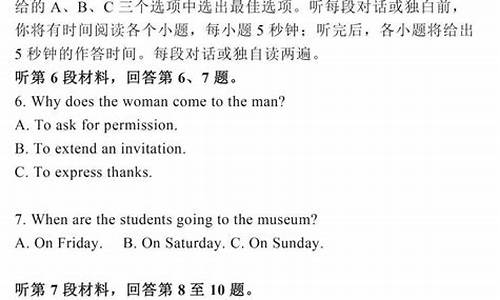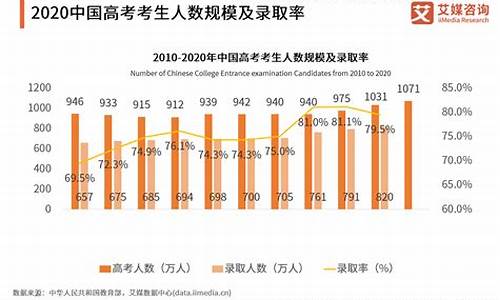您现在的位置是: 首页 > 志愿填报 志愿填报
英语高考题库_英语高考套题
tamoadmin 2024-05-19 人已围观
简介1.福建省高考英语口语试题C 两个句子中无连词,非谓语形式,语序则就把从句加主语,再还原成一个句子便知,After i eat my dinner quikly....D and 连接的是 seized 和took 所以disappear在此应用非谓语形式C 非谓语在little前加aAs you are sleeping,在此AS引导时间状语从句,当你睡得时候。。。slower就slo
1.福建省高考英语口语试题

C 两个句子中无连词,非谓语形式,语序则就把从句加主语,再还原成一个句子便知,After i eat my dinner quikly....
D and 连接的是 seized 和took 所以disappear在此应用非谓语形式
C 非谓语
在little前加a
As you are sleeping,在此AS引导时间状语从句,当你睡得时候。。。
slower就slower嘛,还more slower,slow得比较级是slower.
福建省高考英语口语试题
2008年高考英语全国卷II试题分析
作者:贵州省瓮安中学 石世学
2008年全国高考已经结束,就今年全国高考英语不含听力卷试题设计及试题整体所体现的典型特色,我们就此作一个剖析及归纳。
就试题总体而言,全国卷II的英语试题体现出难易梯度搭配适度,试题结构科学,考查范围涵盖面广。下面我们来看看考查的具体情况:
一、语音知识
语音知识的五小题中,分别按照这样的规律来设计试题:a)元音+辅音字母组合一个小题;考查our组合:course A. journey B. four C. labour D. hour。b)元音字母读音一个小题:具体考查了字母a的读音:match A. separate B. marry C. machine D. many; c)辅音字母读音一个小题,具体考查了s的读音:rise A. purse B. else C. praise D. mouse ; d)辅音+辅音字母组合。具体考查了th组合读音: bathe A. faith B. cloth C. maths D. smooth ; e)元音+元音字母组合。具体考查了ai字母组合读音: Britain A. certain B. train C. against D. contain。
从试题设计规律不难看出:5个小题中全部涵盖:1、元音字母读音;2、辅音字母读音;3、元音+辅音字母读音组合;4、元音+元音字母读音组合;5、辅音+辅音字母读音组合。
最近几年高考试题设计思路均是围绕了这样一个原则,而今年这道大题,又是整体涵盖比较完善和科学的。在选词方面,注重了基础词汇和辨音较为明显的词汇。所以,总体易于辨析出答案:1、B;2、B;3、C;4、D;5、A。
二、语法和词汇知识
语法及词汇知识考查方面,各小题分别考查到如下的要点:
1、交际用语:在第6和第10小题中体现,考查到:(第6小题):I’m afraid not (恐怕不知道呢!),该答案B的判断要根据整个对话的后面句:I don’t know any Anna, either;还考查到(第10小题):go ahead (行的,问吧!)答案选B。
2、连词类辨析:在第7小题和第13小题分别对:once, because, if 及unless;but, till, and及or等词作出在具体语境中的辨析。今年考查的这两道小题设计的语境难度适中,还是易于分辨的。来看看具体的试题:第7题:A small car is big enough for a family of three ________ you need more space for baggage. A. once B. because C. if D. unless.根据语境表达的含义:除非你需要更多放行李的空间,(要不然)一辆小车对于一个三口之家来说,足够了。不难辨别答案D:unless。第13题:Stand over there _______ you’ll be able to see the oil painting better. A. but B. till C. and D. or。根据设计的语境:站到那边去,你就会更清楚的看到那副油画的。选并列的连词and表示顺承,所以答案C。
3、冠词:在第8小题考查,来看这个高考原题:It’s not _______ good idea to drive for fours without ______ break. 设置的这两空都要填不定冠词a, 其原因是idea和break (休息)都是可数名词,在这里冠词a还表示了概念。故而答案选择A。可以看出,考生对前面一空问题解决有把握,但是如果对break (休息)一词掌握不牢的话,解决这个问题就有些困惑了。但是考生如果能知识迁移:take a break (休息一会),这个冠词也能够迎刃而解的。
4. 短语辨析:在第9小题及第12小题出现了对turn及pick构成的短语的考查,第9小题更偏向于短语辨析考查,而第12小题则偏向于在结合短语的基础上考查非谓语动词。这两道试题涉及的短语有:turn off (关掉),turn around (转身),turn over (翻页,随便看看),turn up (出现)以及pick up(捡起,拾起)。
5. 虚拟语气:考查虚拟语气,在这几年的高考试题来看,不常出现,所以涉及到虚拟考查,这属于难度偏大的一道试题。这里通过前面的语境及谓语结构(这是解答虚拟语气试题的关键):If the weather had been better, we could have had a picnic.这个条件句明显的谓语都是展示了时间的过去,及过去时间段上的虚拟。故而在 But it ______ all day的空里,可以判断答案rained.
6. 情态动词:情态动词由于属于英语学习的难点和热点,全国各地高考年年必考,今年的全国卷II也不例外,本套试题把情态动词设置在第17小题:Lisa ______ well not want to go on the trip----she hates traveling. A. will B. can C. must D. may。考查了may 表推测的语言功能。
7. 动词时态:动词时态也是英语的热点。今年考查了一般将来时(will+V),来看本试卷第14小题设置的语境:If their marketing plans succeed, they ________ their sales by 20 percent. A. will increase B. have been increasing C. have increased D. would be increasing. 该题选项:A. will increase.语境比较单纯,易于判断出时态。
8. 从句引导词问题:今年,该试卷设计了定语从句稍微偏难一些的非限制性定语从句的引导词which(指代前边整句话的内容)来考查。这个考点具体分布在第16小题。来看试题:The road condition there turned out to be very good, ________ was more than we could expect. A. it B. what C. which D. that。答案选择which,which在这里引导一个非限制性定语从句。整句话逻辑意思不难得出:“那里的这条道路证明是非常不错,这,超出我们的想像的。
9. 动词词义辨析:在第18小题中,设计了:collect(收集),contain(容纳),load(承载),以及save(节省)四个动词进行辨析。这需要考生具备比较准确的理解词义的能力。
10. 介词或副词(短语)辨析:在第15小题和第19小题均考查了对介词的辨析。其中比较有意思的是:在口语中like=like about。所以,第15题考查了介词about和like搭配的口语使用。19小题中,考查了at least(至少)这个状语固定短语。
11. 强调句型:这个考点分布在该大题的最后一道。考查了强调句型It is +被强调部分+that+句子剩余部分。所以该小题解答,对大多数考生来说,比较得心应手,得分率较高。
以上全部是08年这套试卷的语言考查项目的汇总。可以看出,就这道大题来说,设计的语境,结合的语言点都比较科学合理。其试题的难易也有区分度,有利于成梯度考查不同档次的考生。
三、完形填空
可以说,近几年来的全国高考英语试卷中,都精心选取了一篇富有思想性和教育意义的的材料作为完形填空试题,可以说,优秀的材料展现给考生不仅仅是它的能力测试性,更注重了思想寓意的渗透。
今年在选材上,同样选取了生活之中一件极其普通的琐事:母亲(即本文的作者)不厌其烦的年复一年的为孩子们上学包午餐,随同午餐盒,这位母亲总坚持给孩子写上简单的一张便条,便条上都是些丁点儿鼓励的话语关于即将到来的考试啊运动比赛啊,还有一个特殊时刻的感激啊等等都写上两句。就这样,这位母亲从孩子一开始上小学到高中毕业都一直坚持这样做。文中特意还刻画了儿子Marc大学毕业后想回家而打电话给母亲的事情。文章没有一个love字眼,但是却让人从内心震撼:天底下的母亲在生活小事上处处传递的伟大的爱!作者用朴实的文字,描述了比天还大,比海还深的亲情和母爱!
如果考生能吃透作者的写作意图,透过这个角度进行语言的思维,这篇看似比较复杂难懂的文章就会容易多了。就语言特色来讲,它也考查了这些语言点:动词,形容词及副词,名词,动词短语,介词短语及非谓语等等。当然,完形填空试题还有一个重要的侧枝功能,就是上下文逻辑的理解考查,在这篇测试中,也综合考查到了。本测试更多的偏重到了逻辑选词,所以,多数考生在对全文理解不透的情况下,往往感受到了该题偏难。
四、阅读理解
如果说完形填空的材料在选材上注重了家庭成员间体现出来的亲情的话,那么阅读试题A篇则围绕“爱”而透过另外一个侧面―――师生间的关爱和感恩而精心挑选了易于为大多数考生理解的文字材料作为阅读第一篇的测试。A篇阅读体裁为叙事性文体,通过第三人称的角度讲述一位女教师Mrs. Thompson和她的学生Teddy之间一件让她观念和教学方法都彻底改变的事情的描叙,再次在试卷中体现了高考测试也同时是思想教育和情感培养的种有效方式。
文中渲染了一件让女教师Mrs. Thompson彻底感动的事件:失去母亲而同时失去母爱的小男孩Teddy一天把他妈妈以前的香水作为圣诞礼物送给Mrs. Thompson时,还说道“Mrs. Thompson,today, you smell just like my Mom used to.”就是这样一句童真无邪的话,透露出小孩子失去母亲的孤单。这句让她心灵震撼的话语刺激了她的泪水,也同时彻底改变了她对小孩子的成见和彻底让她认识了自己的职业:由教“书”转变为教“孩子”。她的关注也让小孩Teddy彻底发生了改变:慢慢变成了好学生……一直到大学乃至成为医学博士。对老师的感恩之心也一直延续下来。
阅读B篇则主要通过对事实的研究,论证了人的口音变化的事实。而C篇,则揭露了一个社会问题――商人们对顾客的误导。D篇选材于医学的某一方面的研究――对巧克力中theobromine(可可碱)独特的治疗咳嗽的功效的对比研究,该篇属于科普性读物。而E篇阅读则是一篇广告体的形式也测试考生们的有目的性阅读的能力。
从五篇阅读测试题综合看来,文字材料和试题设置方面均普遍感觉难度中,甚至还低于前几年的难度,试题普遍的得分率会高于往几年。
五、补全对话
今年的情景设置上注重交际口语的逻辑性,所以在设计上,我们可以看出上下句之间逻辑性很强,基本上的上下句都有承前启后的关键词,所以抓住这些关键词选取对应的句子就容易多了。比如:第82小题:What can you do there? 在接下来的答句则出现了:…..you can go for long walks……再比如第84小题:……What a good place to stay in! 接下来的句子就马上:No, you can’t stay on the island……
所以,这道交际对话试题,在整套试题中相对容易,学生解答得也较为轻松。得分率普遍高。
六、单词拼写
可以说,这道大题难易交叉搭配,比如,认出(recognize),二月(February),翻译(translate),游泳(swimming),邻居(neighbors)及相反(opposite)这些词复现率高,属于容易的单词。但是对于:听写,三明治这些词,则会出现模糊的现象。
但十个单词的选择上,均兼顾到高频词,常用词和基础词汇。也结合了具体的语境句来考查。
七、短文改错
今年的短文改错较好的融合了时政题:北京奥运这个题材来设计。考查了学生运用基础知识的灵活度。较为全面考查考生的逻辑理解能力和基础语言掌握能力。逻辑方面比如:第84题;基础方面比如:第76,78,81及85小题。
八、书面表达
今年(2008)这篇高考卷(不含听力)书面表达试题,难度设计稳定在最近三年来的平均水平内。从体现的试题普遍性方面,这套试卷的书面表达选取了近年来高考试卷较为普遍的书信体裁这种实用文体。体现了 “稳定”的高考测试原则。从写作题材及内容上看,这也是考生们平时训练中比较熟悉的。它没有过多追求 “偏”与“奇”。
但是,从书信的针对性来说,这可是最近几年来的新突破―――由以前话题“对英文学习方法咨询”变成了对“中文学习方法的咨询”。
可以说,试题设计体现了“时代性”原则:由以前习惯的对英文学习的建议转向于对中文学习的建议。可以说,这套试卷的书面表达看似与考生们平时所见的没有两样,但,它蕴含着时代性的突出特色,紧跟时代,集中展现了当今世界对中文学习的关注及热情。其实,从另外一个侧面体现了高考试题也会展现它在国家发展和世界主流趋向方面的作用。
来看今年的书面表达试题原文:
假如你叫李华,你的英国朋友Peter给你写信来咨询怎样提高中文水平。请你根据以下提供的要点,写一封回信:
1、参加中文学习班;
2、多看中文书刊、收看中文电视;
3、听中文歌
4、交中国朋友
要求:1、100字左右;
2、为使行文连贯,你可以适当增加一些内容;
3、信的开头和结尾已经给出。
Dear Peter,
I’m glad to receive your letter asking for my advice on how to learn Chinese well.
_____________________________________________________________
____________________________________________________________
____________________________________________________________
____________________________________________________________
Yours truly,
Li Hua
考生在写作中,注意思路不要受到以前训练的固有模式,即:对英文学习方法的建议的干扰,我们已经问卷,发现有学生粗心大意,按照以前的训练思维写成了“英语学习的方法建议信”。其二、考生需要在信中有机的整合试题提供的四点信息:1)、to take a Chinese course; 2)、read more Chinese newspapers and magazines and watch more Chinese TV programmes; 3)、to learn and sing Chinese songs; 4)、make more Chinese friends;
考生在行文的整体性上,要合理使用到一些连接词或短语或结构,比如:you’d better…; I think…; I suggest that….; first/ at first/first of all…; secondly; then; as a matter of fact…; generally speaking; I wish…/I hope…etc.
来看提供的范文:
Dear Peter,
I’m glad to receive your letter asking for my advice on how to learn Chinese well.
Here are a few suggestions. First, it is important to take a Chinese course, as you’ll be able to learn from the teachers and practice with your fellow students. Then, it also helps to watch TV and read books, newspapers and magazines in Chinese whenever possible.
Besides, it should be a good idea to learn and sing Chinese songs, because by doing so you’ll learn and remember Chinese words more easily. You can make more Chinese friends. They will tell you a lot about China and help you learn Chinese.
Try and write me in Chinese next time.
Best wishes,
Li Hua
总体试卷看来,今年(2008年)的全国高考英语II(不含听力卷)的布局合理,难易适度。利于考生的语言能力的发挥。没有出现偏题和怪题。融入了情感教育信息,涵盖面较为广泛。也能突出语言技能的灵活运用。是一套结构合理和科学的高考试卷。
2008 高考口语试题
第一、二套题 回答问题
1. How do you like your school?
2. What present will you give to your mother on her birthday?
3. What present will you give to your father on his birthday?
4. What will you do to protect yourself when an earthquake broke out?
5. What should you do before leaving the lab?
6. Please say something about either of your parents.
7. Will you introduce yourself briefly?
8. Do you like traveling? Why or why not?
9. What sports do you like best? Why?
10. What do you think of your head teacher?
11. How do you improve your English?
12. Say something about your family.
第三份
1. What do you think of Sichuan earthquake?
2. Please say something about your family.
3. Where would you like to go for your holidays?
第四套:
第一份
1. Who is your favourite singer? Why?
2. How do you improve your English reading?
3. How do you like your English teacher?
第二份
1. Do you like traveling? Where have you been? Which place impressed you most? Why?
2. How do you like your school?
3. How do you improve your English listening?
第三份
1. Who is your favourite sports star? Why?
2. How do you improve your oral English?
3. Do you like your head teacher? Why or why not?
三:
( 1 ) Dinner starts with a small dish, which is often called a starter. Some people pray before they start eating, and other people may keep silent for a moment. Then you can say “Enjoy your meal” to each other and everybody starts eating. For the starter, which you eat with the smaller pair, you keep the knife in your right hand and the fork in your left. After the starter you will get a bowl of soup – but only one bowl of soup and never ask for a second serving.
The next dish is the main course. Many Westerners think the chicken breast with its tender white flesh is the best part of the bird. Some people can use their fingers when they are eating chicken or other birds, but never touch beef or the meat on bones. It is polite to finish eating everything on your plate, so don’t take more food than you need.
( 2 ) Chuck learns how to be a good friend to Wilson. Even though Wilson is just a volleyball, he becomes fond of him. He talks to him and treats him as a friend. Chuck learns that we need friends to share happiness and sorrow, and that it is important to have someone to care about. He also learns that he should have cared more about his friends. When he makes friends with Wilson, he understands that friendship is about feelings and that we must give as much as we take.
A volleyball is certainly an unusual friend. Most of our friends are human beings, but we also make friends with animals and even things. For example ,many of us have pets, and we all have favourite objects such as a lucky pen or a diary. The lesson we can learn from Chuck and all the others who have unusual friends is that friends are teachers. Friendship helps us understand who we are, why we need each other and what we can do for each other.
( 3 ) Rock and pop music are becoming more and more similar, but
Rock and pop music are becoming more and more similar, but there are still some differences. Most pop singers use the music to make money and become rich and famous. Rock singers, on the other hand, make music their life. They play music to make themselves feel better and happier. They do not think how much money they can make from a song, instead, they sing for their feelings and live for music.
Pop songs and rock songs are written in different ways. A pop song is written in a "factory" where one person writes the words, someone else writes the music, and other musicians record it. The singer often knows little about the ideas or feelings behind the song. As for rock music, however, the singers and musicians are all able to write music and work together in a band. When one of them has a strong feeling, he or she expressed it with music and the others help build the song.
四:朗读文章
(1)In 1996,Atlanta was the host of the Olympic Games, an honor the city shared with great cities such as Sydney and Beijing.
(2)Like all of us, disabled people also need inspiration and encouragement. The magazine Literature of Chinese Blind Children was started by Xu Bailun in 1985, when he decided that there should be a magazine for blind people in China. Blind children all over China read the magazine and it has inspired many of them to believe that they can realize their dreams. The articles in the magazine are often about disabled people who have overcome difficulties and learn to live a meaningful and productive life.
About one-third of the articles in Literature of Chinese Blind Children are written by disabled authors and blind children. One of the magazine’s best-known readers is Ye Zijie, who is now a teacher in Huhhot. In the year 2000, he was invited to study in London and became the first visually impaired Chinese to study abroad. Zijie says he was inspired and motivated by the magazine: “It is very important for us to know that someone far away is also struggling as we are.”
( 3 ) When we describe or talk about new inventions, we use words and ideas that we already know. For example, when we want to
When we describe or talk about new inventions, we use words and ideas that we already know. For example, when we want to explain how a computer works, we use words like “memory”, “store” and “cut and paste”. The words are useful, but they are not quite true. A computer’s “memory” is similar to human memory in some ways, but it is also very different. A computer does keep information in its memory, but that is clearly different from other kinds of storage. We do cut and paste, but we don’t use scissors or glue. Using familiar words makes it easier for us to understand and use a new tool, but it may also make it more difficult for us to use the new invention in the best way. After all, what makes a new invention such a wonderful thing is that it allows us to do something we could not do before.
Science is not just about electronics and plastic; it is also about how we think about the world. Now that we are developing new technology at such a high pace, the true challenge is to find new ways of using it. How will we use computers in the future?
第一套
(一)
1、Do you like your monitor? Why? Why not?
2、Is your English teacher strict with you in your studies? How?
3、How are you getting along with your classmates?
(二)
1、What kind of music do you like best?
2、What do you think of your English teacher?
3、Who is your best friend? Say something about him\her.
(三)
1、Do you often use dictionaries when you learn English?
2、what date is your birthday?
3、How do you like your mother?
第二套
(一)
1、Do you often play football/table tennis/volleyball/ Why? Why not?
2、Which do you like better,watching TV or seeing movies?
3、Please say something about your family.
(二)
1、Do you enjoy music? Why? Why not?
2、What's your favourite subject?
3、What do you often do on Sundays?
(三)
1、Do you buy any presents for your parents on their birthdays?
2、What sport do you like best?
3、What are you going to do during summer holidays?
第三套
(一)
1、 Do you often listen to English programs? Why? Why not?
2、What do you do in your spare time?
3、Do you like your school? Why? Why not?
(二)
1、Do you often watch TV? Why? Why not?
2、What are you going to be in the future?
3、Who is your favourite teacher? Please say something about him/her.
(三)
1、How do you usually spend your weekends?
2、Do you have any penfriends? Please say something about him/her?
3、What do you usually do in your spare time?
第四套
(一)
1、Do you like sports? Why? Why not?
2、What did you do after the collage entrance examinations?
3、Please say something about one of your good friends.
(二)
1、Do you think collecting stamps interesting? Why? Why not?
2、What subjects did you study?
3、What do you do to improve your English?
(三)
1、What's your favourite food?
2、How long did you spend on your homework every day?
3、Could you please say something about your school?
第五套
(一)
1、Is it important to learn English? Why? Why not?
2、How many classed did you have in Senior Three every day?
3、What do you do to keep fit?
(二)
1、Do you like English? Why? Why not?
2、How are you getting along with your school life?
3、Who is your favourite teacher? Please say something about him/her.
(三)
1、What subject do you like best? Why?
2、How often do you watch TV?
3、Wh第一套
第一份
1、Why do you study English?
2、Which season do you like best? Why?
3、What are your parents?
第二份
1、How do you learn English?
2、Which subject do you like best? Why?
3、How will you spend your summer holidays?
第三份
1、Do you like English? Why?
2、How do your parents celebrate your birthday?
3、Is your hometown beautiful? Say something about your hometown.
第二套
第一份
1、When will the 29th Olympic Games be held in Beijing?
2、Do you celebrate your birthday? How ?
3、What‘s your favourite food? Why?
第二份
1、What do you usually do for your holiday?
2、What do you think you can do for the disabled people?
3、How do you spend your spare time?
第三份
1、Do you like playing computer games? Why? Why not?
2、Is the computer useful in our daily life? Please give some examples. 3、Say something about your hobby, please.
at's your interest? Please say something about it?
第三套
第一份
1、Do you think spoken English is important? Why? Why not?
2、What‘s your favorite subject?
3、How do you usually celebrate your parents‘ birthday?
第二份
1、How do you like your Chinese teacher?
2、How do you usually celebrate your birthday?
3、Do you often do something good for your class? How?
第三份
1、How much time do you spend on English reading everyday?
2、What does your father do?
3、Is the city/village where you are living beautiful?
第四套
第一份
1、What‘s your favorite sport? Why/Why not?
2、How many classes are there in your school?
3、Are you good at English?
第二份
1、Which is your favorite university?
2、What subject are you good at?
3、Could you tell me something about your family?
第三份
1、How often do you go to see a film/ 2、How far is it from your home to your school?
3、Do you often help do housework?
第五套
第一份
1、What is your favorite subject? Why?
2、How do you usually spend your weekends?
3、What do you think of your school? Please describe it.
第二份
1、How do you usually celebrate your birthday?
2、Do you want to take English as your major? Why? Why not?
3、Can you tell us something about your English teacher?
第三份
1、Do you often ask your English teacher questions? Why/ Why not?
2、How can you improve your spoken English?
3、Would you please give a brief introduction of your family?
第六套
第一份
1、How do you find your English teacher?
2、Do you love music? Why/Why not?
3.Which university do you like best? Why?
第二份
1、Do you often watch TV at home? Which channel?/Why not?
2、How do you usually spend your weekends?
3、What are you going to be in the future?
第三份
1、Do you love your hometown?Why?/ Why not?
2、What is your favorite sport?
3、What do you often do in your spare time?
第一套
I、
1、Do you like music? Why/Why not?
2、What subject do you like best? Why?
3、Why do you learn spoken English?
II、
1、Do you like spoken English? Why/Why not?
2、Do you listen to music while you are studying?Why/Why not?
3、What will you do if you have a lot of money?
III、
1、Do you think friends are important to you? Why/Why not?
2、Please say sth about one of your best friends.
3、What TV programme do you like best? Why?
第二套
I、
1、Do you often watch TV? Why/Why not?
2、What are your hobbies? Please say sth about them.
3、How do you celebrate your birthday?
II、
1、How do you spend your weekends?
2、What‘s your favourite sport? Why?
3、Do you think money is very important to you?
III、
1、Do you think friendship is important to you? Why/Why not?
2、What is your favorite food? Why?
3、Do you like animals? Why/Why not?
第三套
I、
1、Please say sth about your hometown.
2、Do you often play computer games? Why/Why not?
3、What is your favorite university?Why?
II、
1、How do you spend your spare time?
2、Please say sth about one of your good friends
3、Do you love your school? Why/Why not?
III、
1、Do you like to have a part-time job?Why/Why not?
2、How do you find your English teacher?
3.What is your favorite subject?Why?
第四套
I、
1、How do you practise your spoken English?
2、Do you remember your parents‘ birthday?How do you celebrate them?
3、What season do you like best?Why?
II、
1、Would you please introduce your family?
2、Do you like fast food?Why/Why not?
3、Do you think friendship is important to you?Why/Why not?
III、
1、Do you share your feelings with your friends?Why/Why not?
2、Are you ready to help others?Why/Why not?
3、How do you improve your spoken English?
第五套
I、
1、Do you keep any pets?Why/Why not?
2、How will you spend your holidays this summer?
3、Do you like traveling?Why/Why not?
II、
1、How do you spend your pocket money?
2、Where would you like to travel?Why?
3、Do you think that good memory is important in learning English?Why/Why not?
III、
1、What kind of music do you like?
2、What do you do to improve your English?
3、Say sth about your hobby,please.
就只找到这些 希望对你有帮助









